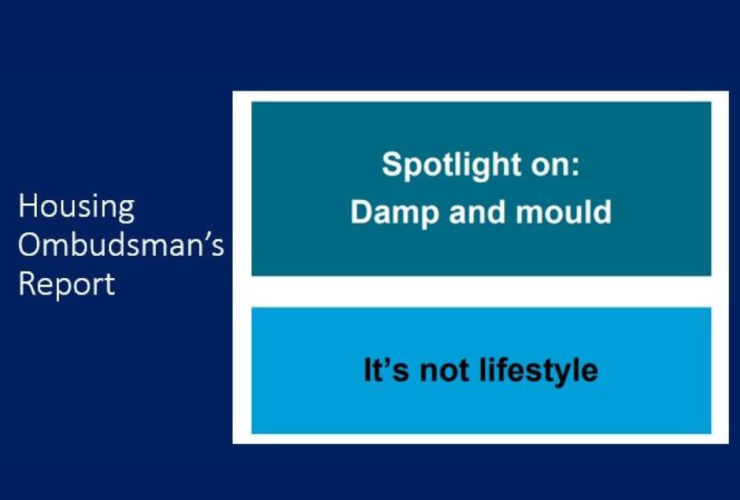
Damp and Mould – not a lifestyle issue
Yesterday saw the awaited publication of a follow-up report from the Housing Ombudsman Service “Spotlight on damp and mould – it’s not lifestyle”.
Not only was this published alongside a separate report from the Regulator of Social Housing which identifies the extent of damp and mould across the social housing sector (notably affecting up to 160,000 out of 4m homes) but it also coincides with the news of debt collection firms forcing entry to the homes of people – many of whom are on low incomes and/or vulnerable – to install pre-payment meters, a practice which has now been rightly condemned.
In the midst of what is the most severe cost of living crisis of recent times, the longstanding attitude across many housing organisations that damp and mould is somehow the responsibility of the resident is now being challenged. In its report, the Ombudsman criticises organisations that have now started to adopt euphemisms such as “internal environmental factors” which amount to the same excuse.
What are the findings of the Ombudsman and how should landlords be developing a more robust and appropriate response?
The report is informed by the Ombudsman’s casework – with the number of related complaints to the Service increasing from nearly 2,000 in 2020/21 to almost 4,000 in the nine months to December 2022. It is also informed by responses from 26 out of 40 landlords contacted to ascertain their actions following the Ombudsman’s previous report from October 2021. Some of the themes are depressingly familiar – hiding behind legal proceedings (a factor in the tragic death of Awaab Ishak), cultures and attitudes that still place responsibility with the resident or are based upon pre-conceptions, a lack of knowledge of the stock which should otherwise inform a risk-based approach to tackling damp and in many cases – surprisingly – the lack of a dedicated Damp and Mould Policy.
In 2021, ARK was commissioned by a large landlord to undertake an independent investigation following damning coverage on ITN of how it had dealt with complaints of damp and mould from residents of two tower blocks. Our findings were consistent with those above – a lack of capacity and competence; poor operating culture with a lack of care and respect for residents; systemic problems in communication with residents and dealing with complaints; weak performance management; and poor use of data and intelligence by the landlord and contractors, including a failure to tackle root causes.
What should landlords be doing to address the issue in a proactive manner?
From a cultural perspective, the report stresses the need to use complaints effectively and not see minimising number of complaints as an end in itself, but rather understand who doesn’t complain and why (i.e. “find your silence”). Proactive communications in multiple formats are essential, as are knowledge of residents and an understanding of the factors that might increase the risk of damp, for example, occupancy levels and the use of heating and ventilation. Improved knowledge of the stock is essential – stock condition surveys, HHSRS assessments and annual ‘MOT’ visits all have a part to play, but so does analysis of repairs (which is not an easy task as few organisations specifically categorise damp in their repairs descriptions), empty homes and complaints in order to inform both planned and reactive works. Interestingly, whilst we all associate Net Zero Carbon with contributing to tackling damp and mould, the report cautions against blinkered approaches to Net Zero that may drive more residents into fuel poverty, for example, increased use of electric heating.
ARK is delighted to be involved at next week’s roundtable event in Birmingham – “The Damp and Mould Debate” – which has been organised by the Communities & Housing Investment Consortium (CHIC). Richard Blakeway from the Housing Ombudsman Service will be presenting the report’s findings and discussions will be taking place in relation to landlord and sector culture, preventative approaches, linking asset management with health and wellbeing and the use of technology. Further details on the event can be obtained from The Damp and Mould Debate – CHIC Ltd.
At ARK Consultancy, we work with many housing providers to help them provide good quality homes through effective asset management, using data and insight to inform investment plans. If you wish to learn more on this matter or would like to speak to an expert on how we could support your organisation call us today on 0121 515 3831.

Tim Frondigoun
Director
Tim is an experienced housing and business change professional. A Fellow of the Chartered Institute of Housing, he has significant experience of housing management, maintenance and asset management, having been Director of Operations for two Midlands-based Registered Housing Providers.
Tim has more recently provided consultancy and business services across a wider range of public services including procurement, traded services and social care.
News & Insights
Read the latest housing sector news, blogs, and commentary from ARK.

Building Safety
By Luke Beard ·The deadline for registering an existing higher risk building (HRB) with the regulator and submitting the required key building information …

Are you ready for the Supported Housing (Regulatory Oversight) Act 2023?
By Nick Sedgwick ·If you are a supported housing provider, you need to be aware of the new regulations that are about to …

International Women’s Day 2024
By Chris Seeley ·The theme of International Women’s Day 2024 is the question ‘What does it mean to truly inspire inclusion?’, we asked our …
Subscribe to our newsletters for the latest industry insights
Our newsletters and reports will keep you updated on topical issues from the sector as well as what’s happening at ARK.
